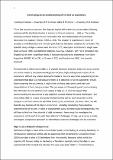Converging on an understanding of the déjà vu experience
Abstract
Déjà vu is a transient, phenomenologically rich, but outwardly invisible memory experience. Its frequent experience is associated with some specific conditions, e.g. temporal lobe epilepsy, though infrequent experience amongst the broader population is widespread. We identify three approaches to the study of déjà vu that focus on different combinations of the properties outlined above: (1) the study of naturalistic experiences in broad samples; (2) the study of observable experiences in special samples; and (3) experimental approaches in broad samples. Each approach has yielded insight, though trades this off against the generalisability of findings to our understanding of naturalistic déjà vu in the general population. We review the advantages and disadvantages of each approach, before proposing a convergent approach that overcomes many of the methodological challenges specific to each individual approach. We propose a standardised, large-scale, collaborative approach, with which déjà vu experiences are prospectively recorded and interrogated using ubiquitous technology (e.g., mobile phone apps). Such an approach would afford the advantages of each individual approach above, but would require large-scale coordination. As the study of déjà vu matures, we believe a convergent approach has tremendous power to reveal more of the true nature of this captivating phenomenon.
Citation
Aitken , C B & O'Connor , A R 2020 , Converging on an understanding of the déjà vu experience . in A M Cleary & B L Schwartz (eds) , Memory quirks : The study of odd phenomena in memory . Routledge Taylor & Francis Group , pp. 288-305 . < https://www.taylorfrancis.com/books/e/9780429264498/chapters/10.4324/9780429264498-20 >
Publication
Memory quirks
Type
Book item
Collections
Items in the St Andrews Research Repository are protected by copyright, with all rights reserved, unless otherwise indicated.

